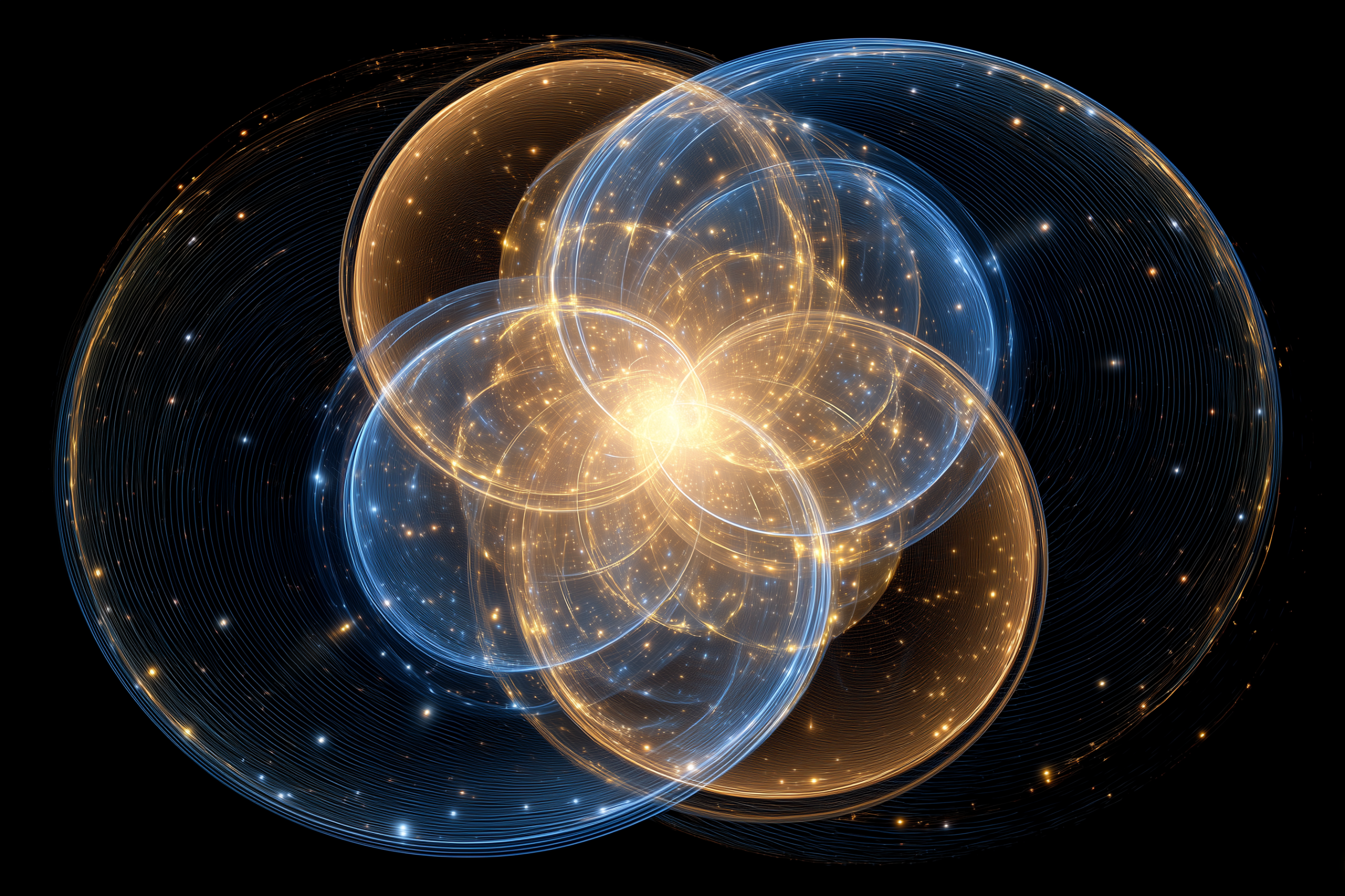Receiving the signal is easy. Trusting it enough to act—without proof—is where most people get stuck.
Yesterday, we explored how to reclaim your natural sensitivity to electromagnetic and quantum fields. You practiced detecting energy signatures, recognizing environmental shifts, and tuning into the subtle information flowing through your biological systems.
But here’s what I’ve discovered about field sensitivity: learning to receive signals is only the beginning.
The real challenge emerges in the space between receiving field information and trusting it enough to let it influence your experience. Because quantum wisdom doesn’t arrive with logical explanations attached.
It simply arrives. As knowing. Without proof.
When Knowing Arrives Without Logic
You meet someone new and instantly sense their character—without needing to hear a word. Or you wake up with sudden clarity about a problem you’ve been thinking through, even though no new facts have emerged overnight. There’s no logic behind it. Just certainty.
This is quantum wisdom in its raw form—information arriving not through analysis, but through direct biological sensitivity.
It doesn’t come with spreadsheets, citations, or verbal arguments. It shows up fully formed. As knowing. Without proof.

But here’s where things get difficult: the moment you try to explain this knowing—to yourself or to someone else—language collapses. Logical language feels completely inadequate. How do you describe a certainty that emerged without steps? How do you justify a knowing that bypassed every rule of rational processing?
That’s when the internal tension starts.
Your logical mind kicks in:
“I need reasons. Where’s the data? What’s the evidence? How can I be sure?”
But the field information has already spoken—through a visceral yes or no, a subtle shift in your energy, a quiet but resolute feeling in your chest. It doesn’t argue. It doesn’t explain. It simply is.
In that moment, most people side with logic. Not because it’s more accurate, but because it speaks the language we’ve been taught to recognize as “real intelligence.”
But consider this:
Your quantum biological systems—your heart, gut, fascia, neurons, mitochondria—have been processing subtle environmental data for millions of years. They’ve kept your ancestors alive through danger, deception, disease, and complex social dynamics.
Consider the parent who wakes moments before their child cries, or the traveler who changes their route just before an accident—field sensitivity guiding survival through information that logic never processed.
This isn’t vague intuition. It’s an advanced sensory network operating beneath conscious awareness—and it speaks in a language we’ve been conditioned to ignore.
The Language Barrier
Quantum field information communicates in what we might call the “felt sense language”—a sophisticated communication system that conveys complex environmental data through sensation, emotion, and direct knowing rather than through words or logical sequences.

This creates an immediate translation challenge.
Logical mind: “I need reasons. Show me the data. What’s the evidence? How can you be sure?”
Field information: “You just know. You feel it — in your body, in your breath, in your gut.”
Logical mind: “That’s not an answer. That’s just a feeling.”
In that moment, most people default to the logical mind—not because it offers better insight, but because it speaks the language they were trained to trust.
But consider this: your biological intelligence has been processing environmental information and making optimization calculations for millions and millions of years. They’ve kept every ancestor alive long enough to reproduce. They’ve navigated countless environmental challenges, social complexities, and survival scenarios.
They’re not less intelligent than analytical thinking. They’re operating with a different kind of intelligence—one that processes vastly more environmental data than logical thinking can handle, but communicates through channels we’ve been trained to dismiss.
The Social Pressure to Dismiss
This translation challenge becomes even more complex when other people enter the equation. Here’s where it gets more complicated: when you do receive clear field information, your natural impulse might be to share it with someone in your immediate circle.
“I just have this feeling about…” “Something tells me that…” “I can’t explain it, but I know…”
And if the people around you respond with skepticism, dismissal, or concern about your “irrationality,” you face an immediate choice: trust your inner guidance or maintain social acceptance.

Most people choose social acceptance.
The desire to belong, to not contradict our tribe, to avoid being seen as “illogical” or “irrational” often overrides the intelligence we’re receiving through field sensitivity.
We’ve all learned that being wrong about something “logical” is more socially acceptable than being right about something “intuitive.”
This social conditioning creates an internal conflict that can shut down field sensitivity entirely. If accessing this intelligence threatens your sense of belonging, your system might unconsciously block the signals to avoid the social tension.
But here’s what’s actually happening: you’re choosing between different types of intelligence, not between intelligence and irrationality.
The Internal Dialogue
When field information arrives that conflicts with logical assessment—or when you can’t provide logical justification for what you’re sensing—an internal dialogue often emerges:
Knowing: “This person isn’t trustworthy.”
Logic: “But they have excellent credentials and recommendations.”
Knowing: “Something’s off about this timing.”
Logic: “But the deadline is firm and the opportunity is clear.”
Knowing: “This isn’t the right path.”
Logic: “But it makes perfect sense on paper.”
You’re not facing a battle between wisdom and foolishness—but between two intelligent systems accessing different data.
Your logical mind processes information that arrives through language, analysis, and sequential reasoning. It’s excellent at working with explicit, verbal, measurable data.
Your field processing systems work with probability fields, environmental patterns, electromagnetic signatures, and vast arrays of subtle information that never reach conscious analytical processing.
Neither system is wrong. They’re simply operating with different information.
The Courage to Trust
Learning to translate quantum wisdom requires developing what might be called “inner courage”—the willingness to trust a way of knowing that doesn’t fit the dominant cultural model of how knowledge works.
This isn’t about abandoning logical thinking. It’s about expanding your definition of intelligence to include the sophisticated biological processing that’s been optimizing survival and development for millions of years.

But this expansion requires courage because it means:
- Trusting information that arrives without logical justification
- Acting on guidance that you can’t fully explain to others
- Accepting that some of your most accurate insights might not be defendable in rational argument
- Risking social disapproval from people who only recognize analytical intelligence
The Art of Translation
So how do you bridge between quantum knowing and logical understanding? How do you develop confidence in field information without abandoning critical thinking?
The key insight: translation doesn’t mean conversion. You don’t need to turn felt sense knowing into logical argument. You need to learn to hold both types of intelligence simultaneously.
Practical translation often looks like this:
Field information arrives as a clear knowing or felt sense. Instead of demanding logical justification, you learn to ask: “What does this knowing feel like in my body? How does it affect my sense of expansion or contraction? What happens when I imagine acting on this guidance versus ignoring it?”
The goal isn’t to convince your logical mind that the field information is “correct.” The goal is to develop facility with non-analytical ways of knowing so you can access the full spectrum of your intelligence.
When Different Intelligences Align
Sometimes field information and logical assessment point in the same direction. These moments feel particularly trustworthy because both intelligence systems are conveying similar guidance.
But the more interesting moments—and the more challenging ones—happen when they diverge:
- Field information says “wait” while logic says “act now.”
- Felt sense says “yes” while analysis says “this doesn’t make sense.”
- Energetic knowing says “avoid” while credentials say “this is clearly beneficial.”
These divergences aren’t problems to solve. They’re information about the complexity of whatever situation you’re navigating. They’re invitations to access more sophisticated forms of intelligence than either system could provide alone.

Living in the Space Between
As your field sensitivity develops, you begin to live more comfortably in the space between logical certainty and quantum knowing. You learn to hold the tension between what makes analytical sense and what feels energetically true.
This doesn’t mean becoming indecisive or abandoning discernment. It means evolving it—expanding it to include multiple forms of knowing.
You begin to recognize that some of your most accurate insights about people, timing, opportunities, and situations have emerged through field sensitivity rather than logical analysis.
You start to trust the knowing that arrives without logical explanation, not because it’s mystical, but because it’s often accurate in ways that analytical assessment alone cannot achieve.
The Ripple Effects of Trust
When you begin to trust quantum wisdom—when you develop the courage to honor the intelligence that arrives through field sensitivity—something interesting happens.
Your decision-making becomes more fluid because you’re accessing more complete information. Your timing improves because you’re sensitive to environmental rhythms that logical thinking can’t detect. Your relationships become more authentic because you can sense energetic information alongside verbal and behavioral cues.
But perhaps most importantly, you begin to experience yourself as a more sophisticated intelligence than you previously recognized. You’re not just a logical processing system with occasional “hunches.”
You’re a quantum biological technology capable of environmental awareness, probability assessment, and optimization calculations that extend far beyond normal analytical capacity.
This isn’t about becoming “psychic” or developing supernatural abilities. This is about recognizing and integrating natural capacities that have always been part of human biological function.

The Recognition
Remember: you ARE a quantum system. This isn’t metaphorical. Your biological systems are constantly processing electromagnetic and quantum field information.
The question isn’t whether you have access to this intelligence—the question is whether you’ve developed the courage to trust it.
When you learn to translate quantum wisdom, you’re not gaining new abilities. You’re reclaiming natural ones that have been dismissed by cultural conditioning that only recognizes analytical intelligence as “real” intelligence.
The signals are already there. You’ve learned to detect them. Now you’re learning the art of trusting what you know without needing to know how you know it.
What kind of clarity becomes possible when you stop needing permission to trust what you already know?
See you in the next insight.


